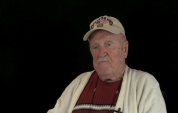5:43 | His uncle was in the Army and had this piece of advice, don't volunteer for anything. Ray Bohn remembered that and never did, especially after he learned about his uncle's fate in New Guinea. The Korean War brought him into the Army and, after basic, he was trained in cryptography.
Keywords : Ray Bohn volunteer Korea Fort Leonard Wood Camp Gordon cryptography 990th Signal Company

Ray Bohn made a decision in his life. He wasn't going to take a back step to anybody. This led to his leaving the Catholic school he attended after clashing with one of the brothers. His trouble continued in the working world and that was fine with him.
Although he was trained in cryptography, when Ray Bohn got to Korea, he was designated infantry and sent to a heavy weapons company. He immediately had a run-in with the 1st Sgt. there and, just like in his private life, he got himself into trouble. Fortunately, an officer brought him over to Headquarters Company to try and make use of his skills.
Ray Bohn describes the Korean War era cryptography machine he was trained to use. He never really got to use it because when he got to the front line, he was made the courier for Headquarters Company.
Besides being the company courier, Ray Bohn had other tasks. Once, while escorting some newly captured Chinese prisoners, he was ambushed by their comrades. Before it was over, he had earned the nickname Headhunter.
At the Korean front, Ray Bohn's HQ company was camped on two sides of a valley. His side was subject to Chinese artillery fire while the other side, where the officers were camped, was sheltered by the hill on that side. During a fierce barrage, they tried to time the reloading and sprint to the other side. Who would make it?
Ray Bohn never really left the front line while he was in Korea. He never saw the cities, ate a lot of C-rations and took up smoking. As the company courier, he had to visit a lot of different locations and it was at one of these near the coast that he was treated to a display of naval gunfire.
The Chinese had no air power but the Russians would send MiG's down into Korea to engage American fighters. Ray Bohn was glad that they weren't using one of the most effective weapons our side had, napalm.
He was inland but still close enough to the coast to feel the effects of a devastating typhoon. Ray Bohn tells how his unit prepared for the storm and what happened when they had to build a rope bridge to their outhouse. It was on the other side of a stream that had become a raging torrent.
As a courier, Ray Bohn had to deliver his messages no matter how much live fire was happening. This could get dangerous, like the time he negotiated a terrible mountain road that was right in the sights of the Chinese artillery. What was his secret that kept him alive?
When it came time for Ray Bohn to come home from Korea, some of the guys were sore because, as a draftee, he was eligible and they were not. When he got home, he went to work with his father at a hardware firm where he started out sweeping floors and then rose to be president of the company.
When asked if he met anyone during his service who inspired him, Ray Bohn responds with two stories that both speak well of race relations in the Army.